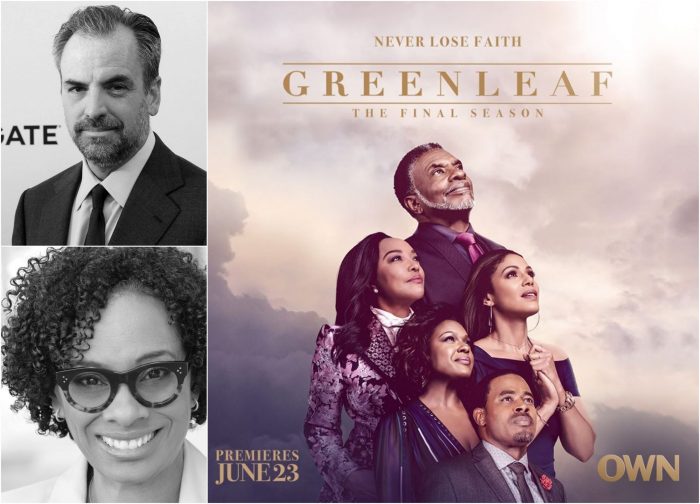
Hello World,
I must say that I’m very much disturbed by recent events in my city of metro Atlanta, but that is why quality entertainment is more important than ever. Although I’m tempted to tune into 24-hour news stations 24 hours a day, I must detach myself periodically and de-stress somehow. Along with exercise, watching my favorite television shows is one of my easiest ways to de-stress, and as most of the readers of my blog know, OWN’s Greenleaf is at the top of my list. That’s why I feel so incredibly blessed that I was able to recently interview Craig Wright, the creator of Greenleaf AND Kriss Turner Towner, executive producer of Greenleaf AND the writer behind Something New, one of my favorite films of all time (more on that later). Yes, after four seasons of recaps (that took me about three hours to write apiece), I finally have some of the answers to some of the questions that I have asked myself and you as we got to know the Greenleafs over these last four years…
First of all, if you haven’t seen the latest trailer for Greenleaf Season 5, check that out below. In a word, RIVETING…And after you see what we can look forward to in Season 5, which starts on June 23 at 9 p.m. EST, read why we can expect what we expect to see as well as how Craig and Kriss got into television writing and more…Enjoy…AND…Share…
On Breaking Into Hollywood:
I read that prior to you breaking into Hollywood, you attended seminary and even worked as an associate pastor at a United Methodist church. Also, I read that while you were working as an associate minister, two Hollywood agents read a play that you had written Orange Flower Water. How did they come across your play?
Craig: I believe that my then theatre agent had once upon a time sent it to them. And that it had sat on a table or under a cup of coffee or whatever and not paid any attention to. And then one day, they decided to read it. But at that point in my life, my sense of my life was I was going to be a minister for the rest of my life.
I read that the day after you graduated from the University of Washington in Seattle, you drove to Los Angeles where you worked at Nordstrom selling shoes (I worked in the shoe department of Macy’s in between career jobs) and wrote scripts at night? Is that true? That move took a lot of faith. Wouldn’t you agree?
Kriss: Very true. Absolutely. Fortunately, I had grandparents who lived outside of L.A. so I had a place to stay but my parents, you know. It wasn’t until I bought the house that they were like, okay, show business is gonna be alright.
Yeah, in college is when I really, really started to going to church. You know my family went to church, but college is when I really started to get into what God was going to be in my life.
On Something New & 42.4 Percent of Black Women Have Never Been Married:
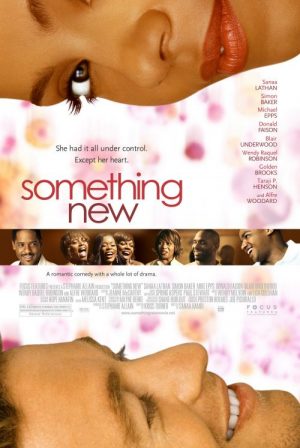 Now, Something New is one of my favorite films of all time. Every time I see it on TV, I have to stop and watch it even though I’m usually doing something else. How did that come to be?
Now, Something New is one of my favorite films of all time. Every time I see it on TV, I have to stop and watch it even though I’m usually doing something else. How did that come to be?
Kriss: Well, first of all, I got married for the first time at 50, and I wanted to be married. I wasn’t so sure that I wanted to have children. I don’t have children, but I do have a stepdaughter. And then a friend of mine, another writer Jacque Edmonds Cofer sent me this article. She had just gotten married, and she was in her forties. And it said that 42.4 percent (my debut novel is a retrospective look at that statistic) of black women had never been married. And I’m sitting in the Bernie Mac office, and I said, ‘That’s the title right there. 42.4 percent,’ and I just started writing. And that was another thing about Bernie Mac. If it was your episode, you would be on set, but even when it wasn’t your episode, you would go to set. So I would go to set and of course, eat free food. (Laughter) And then, after we were done sometimes at 10 or 11 o’clock, I would just come back to my office and write. It was just what so many people were feeling.
How quickly did you write that script?
I don’t know. I think the first draft probably took me about a month and then we sold it right away. I was very happy to have sold it at spec. And then once you get into development, that’s a whole other story. It probably took a year before it was actually greenlit.
So you would work during the day at Bernie Mac and then you would come home and work on Something New?
I would work at the office. I had all of my cosmetics, all of my facial wipes and everything there. I would wash my face and brush my teeth, and then I would go back into my office and write. I had a roommate at the time I think.
Why do you think Something New continues to resonate even now?
Because we’re still single, and it’s still hard. We’re the most educated people, black women, period. And it just gets tougher and tougher and tougher. We have to look at the past – like what did our daddy look like. (Laughter) I married a black man. He’s biracial. But I had to open myself up, and writing that movie was my way of doing that. I never really dated a white guy but I’m glad the movie continues to resonate with people.
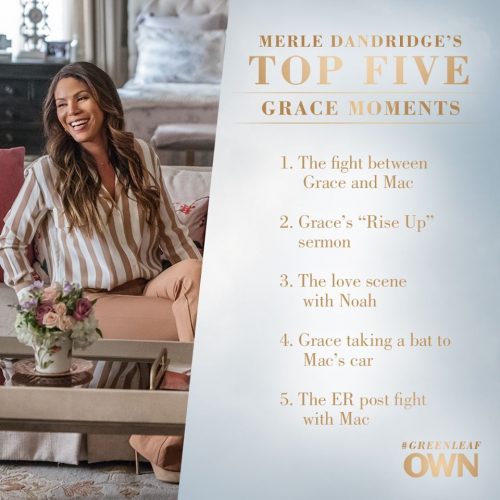
On Meeting Oprah, Creating & Writing Greenleaf:
And how did you meet Oprah?
Craig: We met because she did a documentary called Belief which was great. And at that time, she was with or allied with WME, William Morris Endeavor, and she said, ‘Do you have anyone who has any experience with television but also a past in religion who might be able to watch this and give any notes about it?’ So I was invited to watch it with a small group of individuals and give my thoughts and that’s how we started talking. She said, ‘I hear you used to be a minister.’ And I said, ‘Yeah.’ She said, ‘Of a black church?’ And I said, ‘No, not at a black church.’ And we just started talking.
So how did you get involved in Greenleaf?
Kriss: It’s basically the same way as Craig where Oprah was like, ‘Who knows church?’ My agents knew that I was really in the church so I got a meeting with Craig. It’s so weird the first time I had met with Lionsgate, and I was like, ‘Honestly I had never written on an hour drama.’ And Craig, I don’t think I’ve ever told you this, but I was totally intimidated by the writing. And I said, ‘No.’ I was like, ‘No, I don’t think I can do this. I don’t know if I’m the one.’ And then I had another meeting, months later, with Craig, and he’s like, ‘C’mon’ and I did. And I’m really glad he did.
Why were intimidated since you have experience? Why didn’t you think you were right for this show?
Because I’ve worked on the show, I’m going to say for three seasons, and I still can’t write Lady Mae. I’m still fascinated. I mean I’ll tell you. Yes, I have the title of executive producer but Craig is the showrunner. Every piece of every thing. I don’t think anybody can write this show but Craig. We help him. We write stories. We write drafts. And then it goes through Craig’s magical hands. I’m still like, ‘Whoa, okay.’ We read the draft after it goes through Craig, and we’re just like, ‘Oh, oh, oh. Okay, Craig.’
On Writing About the Black Church:
Since you are white, where you intimidated at all about writing about a black church?
Craig: There are not words. They haven’t invented the words yet for how daunted I was by that idea. I was, I mean if Oprah had not been my prime conversation partner at the beginning of that journey, of course I never would have even considered it.
This show was inaugurated at a time when a white person doing this kind of work wasn’t quite as…it wasn’t quite as hot a topic then as it is now. This controversy, which is totally a well-earned controversy, has accelerated so much, you know, and so quickly, and rightfully so. I mean this would not have happened today. I would have said, ‘No,’ and Oprah wouldn’t have even thought to ask me. That’s my guess.
On the other hand, Oprah, as we all know, is a very, very special person. And while she’s obviously keenly aware of race and racial divisions and how they have affected our history and how they affect our present day, she also sees beyond race and I think she has conversations with whomever she wants to have them with, you know. Sometimes that makes people a little mad, actually.
So I was tremendously daunted by the idea, and so what I did was the day that she said she wanted to do that, that she wanted to do the show with me, I went directly across the street to a tattoo parlor, and I got these tattoos. I got these two arrows. That was me telling myself if I’m going to do this, there is only one way it’s going to work. It means I have to meet people, shake their hand with my right hand and write what tell me to write with my left hand, starting with Oprah. Just like, ‘Get out of the way, Craig, and try to transmit what Oprah is trying to say.’ I will stop talking in one second.
But this show is really Oprah’s in the sense that she was really celebrated as a young girl in the church because she was so good at speaking, you know. People identified her as a ‘talking child.’ However, when she got a little older and started asking questions about some things that she didn’t quite understand or think were fair, they said, ‘We don’t want to hear your questions anymore. Be quiet,’ right and so that was sort of the beginning decades earlier of this show because that left Oprah wanting to answer those questions.
Now, did you visit a lot of black churches?
Craig: In Los Angeles, I did. But then also, you know, I also immediately set out to hire, you know, black writers who were attending churches. Even more important than me, even as a visitor, I mean I can go there and ask questions but I don’t have the lived experience of having been raised in that church. So we immediately set out to hire a writing staff of people who could speak from experience. We also had a consultant who was in Cleveland. She worked very high up in a very large black church in Cleveland I believe, and she read every script and every outline. And her husband was a minister as well. So she would weigh in on everything and always tell us when she thought we might be tipping too far towards this and that in the interest of drama.
On Greenleaf Plots:
In Season 1 and Season 2, we learn that Lady Mae and her brother Mac McReady and the fact that she was molested by her father and that her brother was a molester and that he molested his niece and Lady Mae’s daughter Faith. Why was this an important storyline and will this storyline be mentioned at all in the final season?
Craig: I think in the broadest sense, Greenleaf was always about the power imbalance between women and men inside the structure of the church and you know, I always used to say, I got my start at Six Feet Under and I always used to say like Six Feet Under was a machine designed to kill Nate Fisher. Greenleaf was a machine designed to displace the Bishop or, at the very least, to raise Lady Mae up. And Grace is really the one who comes home to do it even though neither she nor Lady Mae would say that because they don’t see it that way.
But my point is that sexual abuse within the church and within families of all colors is a fact. And in this case, it’s kind of like the tip of the iceberg of the power dynamic that allowed us to get into the story in a way they that would have a lot of drama but also, like Russian boxes, would always relate to larger issues which is the power of men and the misuse of that power. So it was sort of a good story to use to start the series off even though inevitably it was going to broaden into larger issues like if Lady Mae is so amazing and she talks that way, why isn’t she running the church? Especially when with every passing episode, it becomes clearer that the bishop has made a lot of moral errors along the way.
Now, from Season 3, we learn that Lady Mae had an affair with Lionel, another pastor, which produced Grace. From the beginning, was it planned that Grace would not be Bishop’s child?
Craig: I will say this. Yes it was always on the table for a variety of reasons. From the very beginning of casting, it was acknowledged by everyone including Oprah that Merle’s skin tone didn’t quite match up with Keith’s. So right from the very beginning, the way that we dealt with that, sometimes jokingly, was like, ‘Maybe you know she’s from a different nest.’ And lo and behold… I don’t think there was never a cheap soap opera trope that we weren’t willing to pick up. If I could have gotten some identical twins on the show, I would have. (Laughter)
You mentioned that you haven’t been able to write Lady Mae. Why? And what characters are in your wheelhouse and why?
Kriss: Lady Mae has such a specific way of talking, the way she articulates things. Simply put, I don’t think there is any writer other than Craig who truly captures her voice and spirit. I remember Lady Mae saying in Season 3: ‘Gigi is always off with that scapegrace, Darius.’ Scapegrace just isn’t in my wheelhouse. That’s all Craig.
Charity was my favorite character to write. I know women like her. Her problems were relatable and I liked that she gave us some comic relief.
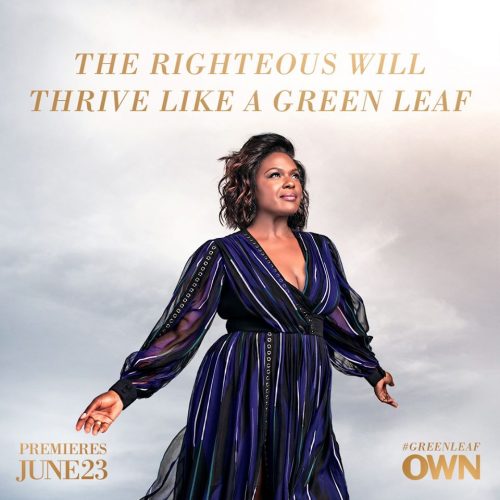
Thinking back to the fact you had some difficulties in dating, as you said you didn’t get married until you were 50 years old although wanted to do so, why do you think that Charity has so much bad luck when it comes to choosing men?
Kriss: For me, I had to shut it down. I had to stop picking, saying yes to guys who not only looked good in person but on paper. I had to stop making excuses for bad behavior. I had to stop overlooking things that I didn’t love… everything from table manners, to tardiness, to wondering why he never introduces me as his girlfriend. (People always said I was too picky. I say be picky.) The Bible says to wait on the Lord. That’s what I had to do. — I think with Charity, she went for what looked good. She went out with whoever asked her out. She didn’t ask the right questions, shut things down when SHE KNEW the brotha was suspect. We/Charity think we can change a man. We’re so afraid that we’re going to lose ‘the one,’ that we’re going to be alone forever. Afraid that God doesn’t have anyone better. I think too, with being a single mother (which I was not) Charity thought her pickings were slim, so she compromised.. settled… And I speak against ALL OF THAT!
On the Return of Beloved Characters:
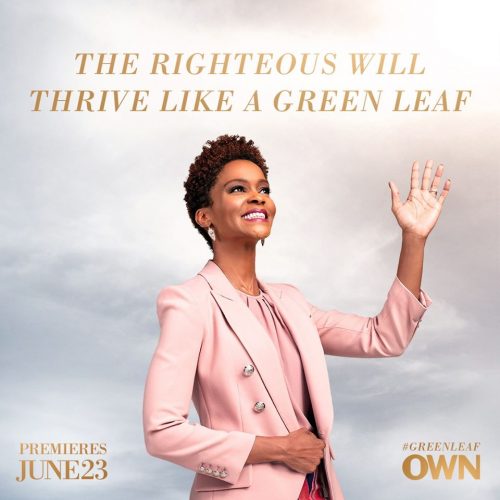
Now at the end of Season 4, Kerissa and Jacob are not in a good place to say the least but I saw Tasha Skanks in the trailer for Season 5. Could Tasha Skanks and Jacob Greenleaf be getting together at long last?
Craig: Well, I’ll just throw that back at you. Do you believe that Tasha is the right lady for Jacob?
Me: I’ve never liked Kerissa from the very beginning. Well, I can’t say that I never liked her. I just don’t like her for him. They just never have seemed to come together. And it seemed like she wanted to be a Lady Mae knockoff, and she just kind of chose someone that would help fulfill that. And I think she’s grown to love him, but I don’t think she necessarily loves him in the way that Tasha feels toward Jacob. And with Jacob, I feel like she’s like a mothering person to him. I’m not sure if he loves her either. I never quite saw them together.
Craig: I think for Jacob, he’s got the stern mom with Kerissa and Tasha is over there like the bad girl. I guess I would like to think that there’s a middle way, that there is someone waiting for Jacob who is right in the middle. Maybe he will meet her this season.
Now if Tasha Skanks is going to make an appearance, is Basie Skanks?
Craig: I don’t think I can answer that without ruining the storyline.
Will Mavis make an appearance or is she just gone?
Craig: The Greenleaf Saga, not the series, could never really end without Mavis making a reappearance.
On Season 5:
You said before that Lady Mae had all of the qualities of what would make a good pastor, but she never had the opportunity. With Harmony & Hope, and with all that they’re doing, maybe you won’t be able to tell me, but what’s going to happen to that all of that drive and ambition that she has to be a pastor?
Craig: Lady May will never and should never stop looking for what to do with her call, and I can say that by the end of Season 5, she finds it.
In Season 4, there was a big emphasis on creating a multicultural church through Harmony & Hope Ministries to break down the “walls of racism.” While the goal of a multicultural church may be a good one, the way Bob Whitmore and Phil DeMars are going about these plans doesn’t look good. What are you trying to say about multicultural churches and how they are being achieved, if anything?
Craig: We’re saying that multiculturalism or diversity of any kind works best when it’s driven by and managed by the minority or minorities who’ve been ‘targeted for assimilation,’ as it were. To put it more simply, it’s not the moral duty of the Black church to fit into the white church’s vision of diversity so that white people can feel spiritually enriched. And there is no single Black church anyway. It’s a case by case situation, and you always have to be looking out for the legacy of those with the most to lose, in terms of uniqueness, by joining the homogenized flock. It’s a delicate business, enforcing or even just marketing multiculturalism, and you always have to be asking, ‘Why and for whom are we doing this?’
So you have these tattoos to remind yourself of these twin goals that you have for the show. Do you have you feel like you achieved your goals since the end of the show is coming up?
Craig: Do I think I achieved the goal of the show? I think we did. If the goal was to start a conversation about the black church and bring that conversation, you know, to a wider audience and basically give the audience the chance to ask all the questions about their churches that Oprah had wanted to ask 30 years ago and let that conversation grow in whatever direction it wants to go, I would say we achieved that goal. The conversation is not over. We have not solved the problems of the world. But we got to start a lot of conversations about a lot of stuff. And to me, the most exciting thing is starting a lot of conversations about the power of women in the church and the role of women in the church and what they’re trying to see in the structure of the church can be and could be, moving forward. So that they’re not just holding up everything from underneath and behind and maybe even more out front. That’s, I think, a great thing that we started to look at.
What do you think Kriss? Did we achieve the goals?
Kriss: I was going to say your fans certainly do think so. I definitely think we achieved those goals, but there’s more.
Craig: There is more to say.
On the Spinoff:
Craig: Well, I can tell you that if Kriss Turner Towner isn’t busy directing Something New 2, that she will definitely be involved with it, if she isn’t too busy. (Laughter) I can tell you that. I can tell you that Oprah and I. You know, Greenleaf was sort of spawned during a lot of conversations with Oprah. She and I spent a lot of time walking around her various beautiful places that she lives and talking about it. And we haven’t had a chance to do that yet because of the quarantine so I expect that the real form of that show is going to take shape once this quarantine is over in the middle of June. So I can go up to Montecito and hang out with her. So it’s very very early.
But what I do know about it is the long-term trajectory of Greenleaf is always about the rise of the women. That doesn’t mean that Jacob doesn’t have a place on that show. I love Lamman so much. But the story is going to be about the continuing rise of all of the women in the family and them facing the struggle that the men faced 35 to 40 years ago. So it’s like okay, it’s your problem. Now what are you going to do? And most importantly, how are you going to treat each other, ladies, when these opportunities for power are now in front of you.
Again, if you need to refresh yourself about what happened on the last episode in November before this final season kicks off, click HERE. And if you would like to keep up with OWN’s “Greenleaf,” and my recaps once Season 5 starts, please click on this link to subscribe to my blog 
Craig Wright is an award-winning playwright whose plays include Lady, Grace, Orange Flower Water and more. He is a recipient of fellowships from the McKnight Foundation, the Jerome Foundation, and the National Endowment for the Arts. Craig served as a writer on HBO’s Six Feet Under, for which he was nominated for an Emmy, in addition to other series such as Lost, Brothers & Sisters, and The United States of Tara. He created and executive-produced Dirty Sexy Money for ABC, Underemployed for MTV, and was an executive producer of Tyrant on FX and Rush on USA. More recently, Craig created and executive-produced Greenleaf for OWN, and, having just completed the planned five-year run of Greenleaf, is about to launch a Greenleaf spinoff for that same network.
Kriss Turner Towner is a writer and producer for television and film. She currently has a comedy in development with the FOX network and is an executive producer on OWN’s award-winning hit drama Greenleaf. Her television and film credits also include Amazon’s The Romanoffs, Showtime’s Black Monday, as well as The Bernie Mac Show, Everybody Hates Chris, and Living Single. Kriss has been recognized for excellence in writing by the Peabody Awards, The Humanitas Prize, and with several NAACP Image Awards. Her first feature film, Something New, won a Black Filmmakers Award for Outstanding Achievement in Screenwriting. Born in Hawaii and raised in Los Angeles, Kriss now lives in Hollywood, California, with her husband, daughter, and three dogs.
Any thoughts?

Great Day!!
I had to reach out about the sermon that Lynn Whitfield performed on the last episode of Greenleaf. I have been with the Lord a long time and I am truly grateful for all that I have learned in my life through great grief from rape, molestation, betrayal and depression. God ALWAYS brought me up in my sprit and keep me moving forward.
I am an Author and so many people asked me had I seen Green Leaf and at the time I had not. But I thank God for the story line because it shows some of the truths that the ministry goes through. The sermon “Make Me New” Lord….I needed that so much on that day. God is doing a new thing in me and giving me courage to live my dreams. The way Lynn Whitfield performed the script reminded me of myself. I literally saw myself back in the pulpit giving a word of change, hope and love to Gods people. I am a Speaker also and I have a word for the people. I have to say thank you for this script. I am truly grateful for the heart and spirit that went into writing it. Sometimes you just have to say THANK YOU!!
Hi Lisa,
First of all, thank you for stopping by After the Altar Call! I agree that this particular episode was so powerful and they say “art imitates life” so I’m not surprised that some people have actually experienced life this in this way. I’m so glad that you made it through so many trials in your life and can use them to encourage people as a speaker! I hope the writers of the show see this comment so that they will know that their words have had a real life impact. Continue to be blessed!